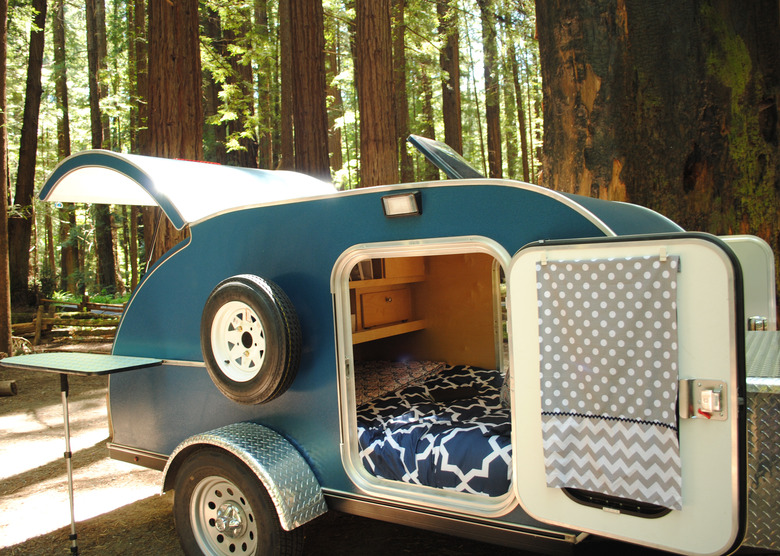Aluminum Siding Vs. Fiberglass Siding On Travel Trailers
We may receive a commission on purchases made from links.
The siding on RVs and travel trailers serves the same purposes it does on your home. In addition to creating a finished look, the siding on an RV protects the interior walls and provides some level of insulation. They may serve the same function, but aluminum and fiberglass siding materials have different characteristics, granting each material pros and cons when used for RV siding.
Pros of Aluminum Siding
Pros of Aluminum Siding
Perhaps the biggest benefit of aluminum siding is the price. Aluminum siding costs much less than its fiberglass counterpart, making it ideal for those on a strict budget or those who are dipping their toes into the RVing world for the first time. If you're buying an RV or trailer for the first time to see how you like it, it makes sense to buy a less expensive model just in case your new hobby is short-lived.
Aluminum is generally easier and less expensive to repair as well. Accidents can happen, and when they do, dents in aluminum can sometimes be pulled back out by a professional dent-removal service. If the dent can't be fixed or if there is another issue, you can usually replace individual aluminum panels. Doing so often makes a good DIY project, which can save you on labor costs.
Trailers made with aluminum siding are typically constructed with an outer layer of aluminum mounted onto a wooden frame. Fiberglass insulation is placed in the walls, and air space is left underneath to create additional insulative properties. This open, hollow area makes it easy for amateur RVers to run electrical and satellite television wires through the walls if necessary.
Cons of Aluminum Siding
Cons of Aluminum Siding
Aluminum siding isn't perfect. It often has a matte finish, which is attractive to some people, but it holds on to dirt, making it hard to clean. A wash and wax are often necessary to get into all the crevices in aluminum and restore its good looks. Aluminum doesn't withstand hail well either and may be more vulnerable to extensive water damage. Because aluminum siding is often mounted on a wood frame, leaks can get down into the wood and rot it away, making for expensive repairs.
Sometimes, the insulation used inside the walls of aluminum-sided trailers falls down inside the wall over time. This can lead to large gaps that limit the insulation's effectiveness. Aluminum trailers also tend to depreciate more quickly than their fiberglass counterparts.
Pros of Fiberglass Siding
Pros of Fiberglass Siding
With its shiny finish, fiberglass siding is much easier to clean than aluminum. A little dish soap and a hose are all you need to have your fiberglass looking new again. Fiberglass also looks better for longer, and as such, it holds its resale value much better than aluminum.
Fiberglass is also less likely to dent than aluminum and is less susceptible to hail damage, which is important depending on the weather where you live and camp. The construction of fiberglass siding also allows for better insulation. Typically, fiberglass siding is glued to foam-block pieces of insulation. This foam is sturdy enough to support itself, which means you won't have to worry about it falling down as it can in an aluminum-sided RV.
Finally, fiberglass travel trailers are a bit more secure. The fiberglass allows doors and windows to be mounted in a way that allows them to close and seal more tightly. Fiberglass also tends to block more noise than aluminum as well, making it easier to sleep in an active RV park.
Cons of Fiberglass Siding
Cons of Fiberglass Siding
Fiberglass siding has many benefits, but they come at a price. Fiberglass siding costs thousands more than aluminum and can make a massive difference in RV price. RVs with fiberglass siding don't have hollow walls, so you can't just hook up TVs and sound systems by running wires through the walls.
Leaks in fiberglass won't rot any wood, but they can cause delamination. This is a fancy way to say that the layers of the fiberglass can separate, causing bubbles and waves in the RV walls. This is an expensive repair and may require you to replace the entire wall.
Fiberglass is less likely to dent than aluminum, but any damage that does occur isn't likely to be an easy repair. A hard impact on fiberglass causes spiderweblike cracks rather than a simple dent. Fixing these impact points is costly and is definitely not a DIY project.
Common RV Siding Misconceptions
Common RV Siding Misconceptions
People often assume that an aluminum RV is lighter than a fiberglass one, but don't make this mistake. Yes, aluminum siding is light, but it gets mounted on a wooden frame, which is heavy. Fiberglass siding is heavy, but it gets installed over an aluminum frame, which is not. The RV manufacturer will tell you the weight of the unit, which is the only way to get an accurate number.
Another common misconception is that aluminum siding contains ridges, and fiberglass siding is flat. This distinction does hold true some of the time, but it's not a hard-and-fast rule. Smooth aluminum is an option, so a single glance across the RV lot won't tell you for sure what you're looking at.
